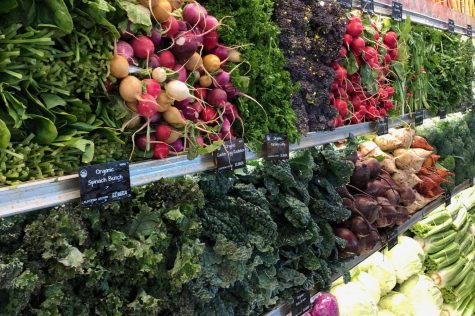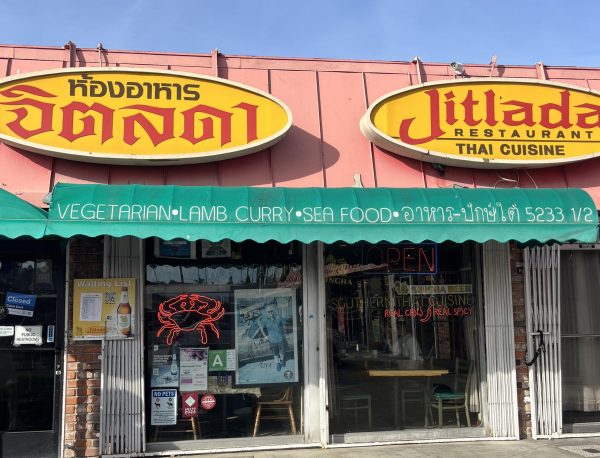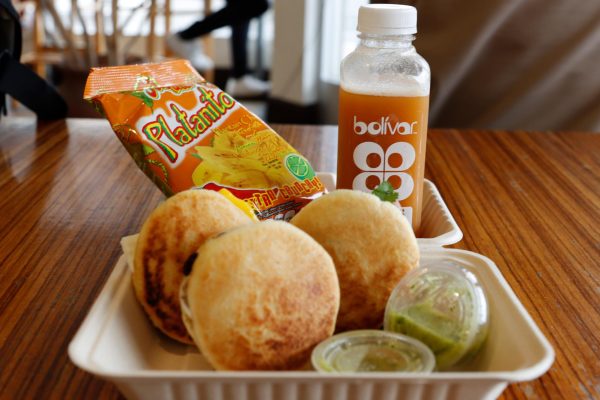Veganism impacts American, Angeleno culture
Photo credit: Liz Haltrecht
Chickpea tikka masala with red quinoa is a plant-based meal. “If you’re hitting a variety of different foods over the course of the day, different colored vegetables, grains [and] different healthy fats, then you shouldn’t have any problems,” Salt Sugar Fat teacher Crystal Ferris said.
Fifty thousand. This is the number of fast food chains in America. According to a study conducted by National Center for Health Statistics between 2013 and 2016, 36.6% of adults consumed fast food on a given day. According to the Huffington Post, Americans consume 50 billion burgers a year. However, across the country, corporations such as Burger King, Carl’s Jr., and Little Caesars are incorporating plant-based foods onto their menus.
Does this mean America’s mindset on veganism is evolving?
Costs and Benefits of Veganism
Crystal Ferris, the teacher of Salt Sugar Fat, a science elective that educates students about nutrition, said she thinks a vegan diet helps minimize the effects of certain diseases and has nutritional benefits.
“A vegan diet is beneficial on two sides. On one side, it’s lacking some of the major health concerns. One of the number one causes of death for Americans is heart disease, and so a vegan diet is typically very high in fiber, really high in plant-based proteins, lacking cholesterol — as much cholesterol — lacking as much bad fats, higher in good fats,” Ferris said. “It’s both sort of warding off disease and also sort of adding the beneficial sides of all the plants and all of the good things that plants have to offer.”
Ferris said she believes that, if practiced thoughtfully, a vegan lifestyle is almost always a good thing. However, she emphasized that veganism can easily have negative impacts on health if a person does not vary their diet.
“There are cookies that are vegan, so you can sustain yourself on a vegan diet but not be healthy, ” Ferris said. “The biggest challenge of the vegan diet is just making sure you are mindful about what you are eating, making sure that you are varying your sources of protein, making sure that its a healthy vegan diet — not just lacking animal products — and really, that’s a challenge of all diets.”
Casey Huff, Sustainability and Design teacher, said that meat has a negative impact on the environment for a variety of reasons.
“The land use used to grow grass and more often grain to feed animals — which take up a large amount of land — is very inefficient,” Huff said. “We are using are arable land that could be used to grow crops and feed people to feed animals that we then eat.”
According to the Water Footprint Network, one pound of beef uses 1.847 gallons of water.
“Methane emissions from the large concentrated animal feed operations or industrial farms is really really terrible; it’s concentrated in those areas,” Huff said. “The runoff that happens from slaughter…enters waterways. So I think that, no matter how you look at it, it’s a significant benefit to adhere to a plant-based diet from purely an environmental perspective.”
Britt Martin has been a certified holistic nutritionist for five years. Martin previously had a corporate job but was not feeling fulfilled. She went back to school to pursue her passion of nutrition. Martin’s approach to nutrition differs from a typical approach, as it evaluates all aspects of life.
“Instead of just looking at what you’re eating or how you’re moving your body, the holistic aspect is looking at everything influencing your health, from your jobs, your relationship…how you’re managing stress in your life [and] how you are practicing self-love and self-care, ” Martin said. “It looks to really get down to the root cause of the problem.”
Martin said she thinks everybody is different and that the vegan diet will work for some bodies and not others.
“It’s really important to find what kind of eating works for you, like, most importantly, focusing on real full foods and then customizing that because some people do better on grains, and some people do better without grains and more protein, and some people do great on a more vegan or raw plant-based diet,” Martin said. “If you are doing a vegan diet, it’s important to just be getting your tests annually to make sure all of your levels and nutrients are balanced.”
Clinical and sports nutritionist Autumn Bates said she thinks being vegan is a “personal choice” and that there are many important benefits that can come from incorporating plants. However, she explained that “there are a lot of wrong ways to do it.”
“You, first of all, have to really look at the reasoning behind why you’re becoming a vegan, so if it’s for animal rights or if it’s for achieving a certain wellness goal, you still need to make sure you’re hitting the markers for the different things your body needs in order to have stable energy levels, in order to have a clear brain and in order to build muscle,” Bates said. “From what I’ve seen, just because all of us live such busy lives, it’s really easy to start relying on processed-based foods, and especially with the vegan realm it’s very easy to fall back on these.”
Veganism in America
On April 1, Burger King announced that it would begin selling the Impossible whopper, which features a plant-based burger patty rather than a beef one.
Ferris has mixed emotions about Burger King’s release of the Impossible Burger.
“Maybe I am a cynic, but I see Burger King as a large corporation motivated by money, and so you know, do I think that it is making Burger King a better place? No. I think that they are motivated by money,” Ferris said. “That said, if it’s an option, it’s going to reduce the number of burgers people eat — hopefully, that’s the idea — and even reducing one burger is better for health and better for the planet.”

The produce section in Erewhon market in Santa Monica. This section has a variety of fresh vegetables. “I think there is still sort of a misconception that people who are hippies, and they’re ultra-skinny, and they’re malnourished,” science teacher Crystal Ferris said. “The truth is, if it is done properly, vegans can be very, very healthy.”
Ferris said she does think that Burger King is looking out for the “bottom line.”
“I don’t think it’s going to change the meat eaters into vegetarians; I think that it’s just going to draw more vegetarians,” Ferris said. “The other issue is that we are drawing people in to eat at Burger King, so what else are they going to get with their burger? They are probably going to get fries and a soda, which are not great for you.”
Huff said she thinks that Burger King’s Impossible Burger is “pretty innovative and cool” and makes veganism more accessible.
“I think a lot of people are turned off by the idea of being vegan because, at first, it was seen as this weird crunchy alternative, but now I think it is a little bit of an elitist mentality,” Huff said. “I think that by bringing it to a place like Burger King where a variety of people with different socioeconomic incomes can access it — I think that feels good and I think it’s a step in the right direction.”
According to Gallup, 3% of Americans identified as vegan in 2018. In 2012, 2% identified, with a 1% change occurring in the past six years.
Veganism’s Role in Los Angeles
Huff said that she has noticed a “proliferation” of Whole Foods stores, Erewhon markets and specialty markets that offer plant-based options in Los Angeles, in addition to an increase in vegan restaurants.
“I am really careful to make any blanket generalizations, but LA is a unique place, it has higher income, it has people who are much more health conscious,” Huff said. “I would say definitely in LA a plant-based or vegan diet has become a little bit more mainstream.”
Los Angeles currently holds 48 fully vegan restaurants, according to HappyCow. However, Huff said she thinks this is not representative of the greater United States.
“LA is really not indicative of how the rest of the country lives, so it would be hard to say, but I do know that I’ve seen Beyonce — she did a vegan cleanse. I’ve seen a lot of celebrities promote [a plant-based diet],” Huff said. “I think that these people have a nationwide, if not worldwide, reach, so I am hopeful that perhaps that message is permeating. ”
Ferris echoed these ideas but emphasized that certain areas in Los Angeles have more accessibility to this diet.
“Veganism in LA is easy and accessible if you are at a certain income bracket, and we know that LA is huge and there are a huge diversity of incomes and neighborhoods, ” Ferris said. “In Brentwood and in West LA, some of the places where campus is and where many of us live, it is very easy, but there are places 10 miles away that would be considered a food desert where it would be considered much more difficult to be vegan.”
Meg Escobar said she does not have any problems with the concept of vegans or veganism in general; however, the implementation of veganism being a viable option to become more sustainable is what upsets her.
“I don’t think that’s ethical because it can be pretty ethnocentric,” she said. “Not everyone has the means to sustain themselves on vegan diets.”
Eden Motzkin has been vegan for around two years. She was vegetarian for most of her life before transitioning to a plant-based diet.
“I decided to go vegan primarily for the animals, but also because of the environmental and health benefits,” Motzkin said.
After becoming vegan, Motzkin said she became more aware of the large online community of vegans, especially on social media.
“My favorite part about being vegan is knowing that I am not contributing to the animal agriculture industries of meat and dairy and eggs,” Motzkin said. “At times, it can be challenging when I’m traveling, but that’s kind of the only hard thing that goes along with it.”
Huff said that being plant-based does significantly reduce your environmental “footprint,” however she is aware that it can be hard to make a shift.
“Nobody can do everything, so whatever we can do to start making a difference, I think, is really important,” Huff said. “We should applaud efforts, not necessarily focus on shortcomings.”



![Chickpea tikka masala with red quinoa is a plant-based meal. "If you're hitting a variety of different foods over the course of the day, different colored vegetables, grains [and] different healthy fats, then you shouldn’t have any problems," Salt Sugar Fat teacher Crystal Ferris said.](https://archeroracle.org/wp-content/uploads/2019/05/project-veg-900x600.jpg)










Karen Haltrecht • Jun 2, 2019 at 8:14 am
Such great various points of view! Overall it seems that there is no big negative to being a vegan, just accessibility and processed vegan foods. Thanks for the heads up on the burgers. Look forward to trying them!